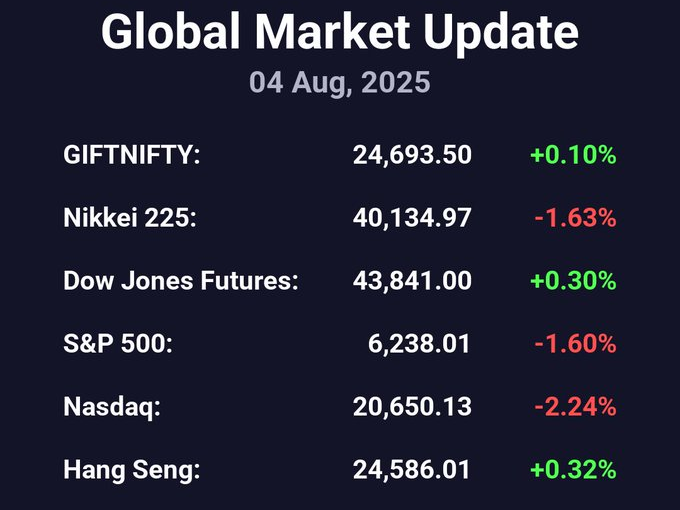Global stock markets began the week on shaky ground as fresh U.S. tariffs announced by former President Donald Trump rattled investors worldwide. Japan’s Nikkei 225 plunged 2.05%, while the broader Topix index slipped 1.86%, signaling unease in Asia’s largest equity market.

The drop comes after Wall Street closed out a turbulent week marked by disappointing economic data and renewed inflation fears. Market watchers are now anticipating a potential interest rate cut by the U.S. Federal Reserve in the coming month.
Asian Markets Mixed as Investors Digest US Economic Tensions
Asian indices showed a mixed performance on Monday, 4 August 2025. While Japan’s markets took a significant hit, other regions fared relatively better.
- South Korea’s Kospi rose slightly by 0.13%, and the tech-focused Kosdaq climbed 0.53%, indicating that some investors remain optimistic about the region’s tech sector.
- Australia’s S&P/ASX 200 dipped 0.21%, reflecting caution over global economic developments.
Market analysts suggest that the reaction in Japan stems largely from its export-reliant economy being particularly vulnerable to new U.S. tariffs.
US Markets Tread Water Amid Tariff Anxiety and Weak Jobs Data
In the U.S., stock futures stayed largely flat on Sunday night following a heavy sell-off on Friday. Investors remained cautious due to rising concerns about inflation, sparked by the Trump administration’s aggressive tariff announcements.
- S&P 500 futures showed minimal movement
- Nasdaq 100 remained steady
- Dow Jones Industrial Average futures edged up by just 15 points, or less than 0.1%
The subdued movement follows a week where all three major U.S. indices logged their worst weekly performances in months:
- S&P 500 fell 2.4% – its steepest weekly drop since May 23
- Dow Jones plunged 2.9% – its worst week since April 4
- Nasdaq Composite slipped 2.2%
Friday’s Sell-Off Fueled by Jobs Report and Tariff Fears
The stock market slide on Friday was driven by two major concerns:
- A weaker-than-expected July jobs report, which signaled cooling economic momentum
- President Donald Trump’s revised tariff strategy, which raised fears of another inflation wave and potential supply chain disruptions
Economists warn that a prolonged tariff war could slow down global trade and weigh heavily on corporate earnings in the coming quarters.
Oil Prices Under Scrutiny Amid OPEC+ Production Surge
Investors are also keeping a close eye on crude oil prices, which remain volatile due to fresh production increases by OPEC+. Rising output may temper inflation in energy markets, but it could also pressure profits in the oil sector.
Brent and WTI prices are expected to face fluctuations throughout the week as supply-demand dynamics shift in response to geopolitical uncertainty.
Outlook: Will the Fed Step In?
With inflation fears growing and economic data showing signs of weakness, the focus now shifts to the U.S. Federal Reserve’s next policy move. Market participants widely expect a rate cut in September, hoping to counter the tightening effects of tariffs and support economic growth.
However, the Fed’s decision will depend on how inflation trends evolve and whether upcoming data confirms a sustained slowdown.
Volatility Likely to Continue
Global markets are entering August with heightened uncertainty. The combination of political risks, trade tensions, and weak macroeconomic indicators is creating a challenging environment for investors.
While some Asian indices like Kospi show resilience, the broader trend indicates caution. Until clarity emerges on U.S. tariff policy and Federal Reserve actions, volatility is expected to persist across major global exchanges.
